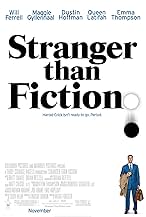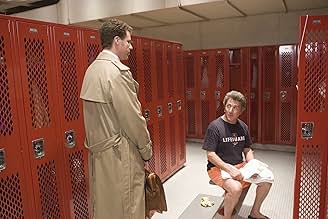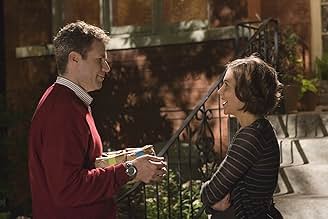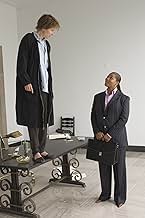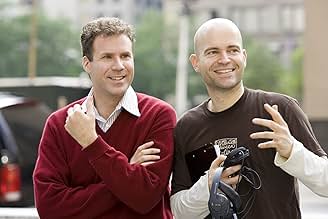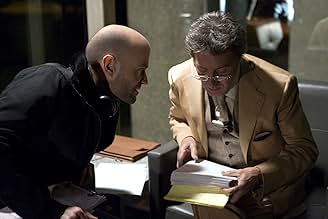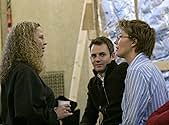L'auditor dell'I.R.S., Harold Crick, si trova improvvisamente oggetto di narrazione che solo lui può sentire: narrazione che inizia a influenzare tutta la sua vita, dal suo lavoro, al suo in... Leggi tuttoL'auditor dell'I.R.S., Harold Crick, si trova improvvisamente oggetto di narrazione che solo lui può sentire: narrazione che inizia a influenzare tutta la sua vita, dal suo lavoro, al suo interesse amoroso, alla sua morte.L'auditor dell'I.R.S., Harold Crick, si trova improvvisamente oggetto di narrazione che solo lui può sentire: narrazione che inizia a influenzare tutta la sua vita, dal suo lavoro, al suo interesse amoroso, alla sua morte.
- Regia
- Sceneggiatura
- Star
- Premi
- 3 vittorie e 15 candidature totali
Recensioni in evidenza
Go see it and take a friend. You will laugh and be happy for a change after leaving a movie.
Forster, with his keen eye and eclectic visual sense, populates the film the sharp and contrasting visual angles, camera tricks, and in-frame oddities (like the play with numbers) constantly keeping the viewer engaged and on their toes. Fun supporting turns from Dustin Hoffman as a literary theorist employed by Krick to help find out if the story he is in is a comedy or tragedy, and Queen Latifah as Eiffel's no-nonsense publishing assistant help guide the viewers through imaginative stretches that are occasionally too clever by half. Ferrel gets to show some nice range here, and much like Robin Williams did with "The World According to Garp" and Jim Carrey did with "The Truman Show," graduates with honors into more high-minded quasi-serious roles. His co-lead Thompson is subtly method and well studied as the reclusive sociopathic author who just can't help killing her characters.
What really seals the deal is Maggie Gyllenhal as Farrell's love interest, the anti-establishment baker he is assigned to audit. She literally lights up the screen. There's one expertly framed and perfectly lit shot of her standing outside her townhouse inviting Farrel in for the night where the light from street lamp off screen is filtered in through the shadows of tree branches and hits her face in such a way that in that brief flickering frame you become insanely happy to be watching such a pleasant marriage of literary concepts inside a visual medium. At this point you don't care how the film ends. You're just grateful to experience that giddy moment of pure movie entertainment.
Directed by Marc Forster and penned by Zach Helm, Stranger than Fiction is an odd mix-mash, combining a standard comedy with existentialist ideas. Number crunching IRS agent and genuine loser, Harold Crick (Ferrell) one day wakes up to find his life being narrated word for word by burnt out writer Karen Eiffel (Emma Thompson). Odd thing is, Eiffel is writing an actual book where Crick just happens to be the main character. To make matters worse, she plans on killing him off as soon as she can make it through a particularly arduous stretch of writer's block.
Originality is one thing that is absent from a majority of contemporary Hollywood pictures, so Fiction immediately gets points for simply trying something different. I suppose it's icing on the cake that the film is genuinely good. Crick, knowing that is death is imminent, begins to break out of his cloistered shell and to experience the fruits of his life. And, in the process he forms a bond with a tax breaking baker (Gyllenhal) and seeks advice from a literature professor, played by a particularly charming Dustin Hoffman
However, even though it is well intentioned, the execution isn't flawless. The romance that develops between Gyllenhal's outcast baker and Ferrell's strait-laced Crick doesn't feel entirely organic. We admire the relationship and smile at its sugar coated sweetness, but we don't necessarily believe their connection. It may taste good, but it doesn't exactly wash down smoothly. Neither, does the film's over reliance on reinforcing generic, "Carpe Diem" philosophies. Towards the second act, things do get sappy. Luckily, by the conclusion, the plot has bounced back to a wonderful limbo of both oddly comic and genuinely heartwarming moments.
For all its flaws, Stranger than Fiction, works. Like a good novel, Forster has fashioned something that is strange, stylistic, and unexpectedly inspiring. And, despite the chinks in its existentialist armor, that's surely something worth writing home about.
The film involves Harold Crick (Will Ferrell), an IRS agent who lives his life by a very strict routine. One day, he wakes up, and begins to hear a woman narrating all of his actions. Suspicious, Crick continues attempting to live his life out, but after an inexplicable comment in regards to his "immenent death", he goes on the hunt for the voice. Randomly spliced into Crick's search is Karen Eiffel (Emma Thompson). She is writing a novel about a character named Harold Crick, and is unknowingly the voice Crick keeps hearing. She is battling a case of writer's block, and spends much of the film attempting to come up with the finale for the character.
Unlike many other existential comedies, Fiction is sweet and almost innocent in its design. Yes, the main focus of the film is pretty grim, but the life-altering questions that keep going around during the film do not become anywhere near as depressing and bizarre as those found in the likes of the work of Charlie Kaufman. In a way, Fiction feels a lot like a Kaufman-written film, but lacking in the means of being totally "out there"; almost like being a decaf as opposed to a regular. As a result, while being an excellent film (albeit slightly predictable), it cannot break past the mold already set by the likes of the absolutely brilliant Eternal Sunshine of the Spotless Mind. It just feels like it is missing that spark that could have sprung it right into the brilliance that all films like this strive for.
Going along with the story itself, it feels a little ill-paced in some few instances, but for the most part sucks you right in and keeps you there. It has many comedic elements, and has some great dramatic sequences as well. They all play well, and while I still would not give him a ton of credit, I was very impressed by Helm's first-time effort. His writing feels vibrant and fresh, and in a film industry with absolutely little originality or thought, it is just great that movies like this slip through and get green-lighted. Every piece of dialogue and background feels well expressed, and just play out astonishingly well. On the topic of Crick however, I liked the idea of how neurotic and obsessive Crick was over numbers, but I thought it was a bit of an overkill to include special effect shots showing the numbers being counted within his head. It felt silly in The Da Vinci Code, so why did Sony feel the need to add it here too?
On that note, much like my being impressed by Adam Sandler from time to time, Ferrell really pulls through here, and does give the best performance of his short career. The psychological trauma that his character goes through is evident in his facial and body emotions, and the way he conveys it on screen is nowhere near what I would have expected. He brings an amazing sense of what this character is really about, and gives him a poignancy that makes him so life-like that it becomes almost too great to explain. This is a pathetically sad man who you cannot help but pull for as the film goes on. And for all the right reason too. He may deliver some of the funniest lines in the movie, but he is totally mature and at ease in this role. Thankfully this means that he stays serious for the most part throughout the film, and does not let any Ricky Bobby or Ron Bergundy slip out. He could have easily blown it, but thankfully, manages to stay in check.
Thompson is another particular standout, especially in contrast to Ferrell. She is broken and weak, searching for the perfect ending. The pain and sorrow that goes through her face as she writes and thinks has a poetic excellence to it, and she only continues to prove how good of an actor she is. Dustin Hoffman and Queen Latifah work well in supporting roles, supporting Ferrell and Thompson respectively as the film progresses on. Hoffman has always had great comedic timing, and he does not let it go to waste here. He plays right off of Ferrell in grand ways, and just feels totally at home in the role. Latifah, while not in the film so much, is very good in her bit parts. Maggie Gyllenhaal also shines here, and clearly has the makings for an Oscar sometime in the late future.
For its small problems, Fiction still is able to prove its worth, and is clearly one of the best films of the year. It will be able to stand proud among the other entries in the existential comedy genre, or just stand proud on its own. Helm's screenplay coupled in with an intoxicatingly great performance by Ferrell make for a great trip to the movies. And sure beats some of the crap that's been released over the past few weeks.
9/10.
I hadn't heard much about this movie prior to seeing it tonight, so I had NO expectations, which is really how I like to see a movie (without any preconceived notions, good or bad).
The movie was very well acted, and told an interesting story. I kind of look at Will Ferrell in this movie the way I looked at Adam Sandler after "Punch Drunk Love". You're not sure how to react to Ferrell/Sandler's on-screen persona's, as up to this point, you've always thought of them as the funny men, who couldn't (or wouldn't) attempt a more dramatic role. For Ferrell, who's probably at the height of his popularity, this was a good move for him, as well as an ideal role.
All in all, I really liked this movie, and I would definitely recommend it to friends/family.
Lo sapevi?
- QuizWhile filming, Will Ferrell wore an earpiece that fed him Dame Emma Thompson's narrative lines, in order to assist the other cast members in reacting more naturally to Ferrell's seemingly non-sequitur lines.
- BlooperNear the beginning, Ms. Eifel dictates "When asked by a co-worker for the product of 67 and 453, Harold drew a blank. He quickly answered 30,351 despite the answer really being 31,305." The product of 67 and 453 actually is 30,351. This was meant to get viewers to question who was dictating Harold's life, the narrator or Harold himself. It wouldn't be a coincidence that the "incorrect" number given by Harold would in fact be the correct answer.
- Citazioni
Professor Jules Hilbert: No, why did you change the book?
Kay Eiffel: Lots of reasons. I realized I just couldn't do it.
Professor Jules Hilbert: Because he's real?
Kay Eiffel: Because it's a book about a man who doesn't know he's about to die and then dies. But if the man does know he's going to die and dies anyway, dies willingly, knowing he could stop it, then... I mean, isn't that the type of man you want to keep alive?
- Curiosità sui creditiDuring the end credits, the names of the characters and the actors who played them were displayed against stylized images of the places where the characters worked.
- Colonne sonoreThe Way We Get By
Written by Britt Daniel
Performed by Spoon
Courtesy of Merge Records
By arrangement with Bank Robber Music
I più visti
Dettagli
- Data di uscita
- Paesi di origine
- Sito ufficiale
- Lingua
- Celebre anche come
- Más extraño que la ficción
- Luoghi delle riprese
- Aziende produttrici
- Vedi altri crediti dell’azienda su IMDbPro
Botteghino
- Budget
- 30.000.000 USD (previsto)
- Lordo Stati Uniti e Canada
- 40.660.952 USD
- Fine settimana di apertura Stati Uniti e Canada
- 13.411.093 USD
- 12 nov 2006
- Lordo in tutto il mondo
- 53.653.224 USD
- Tempo di esecuzione1 ora 53 minuti
- Colore
- Mix di suoni
- Proporzioni
- 1.85 : 1
Contribuisci a questa pagina







